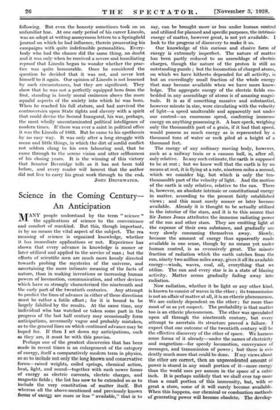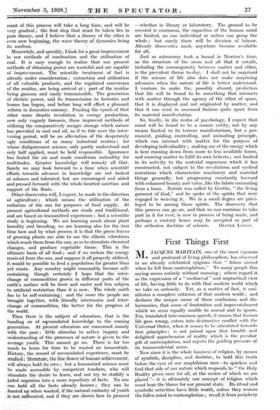Science in the Coming Century— An Anticipation M ANY people understand
by the term " science " the applications of science to the convenience and comfort of mankind. But this, though important, is by no means the vital aspect of the subject. The rea meaning of science is organized knowledge, whether it has immediate applications or not. Experience has shown that every advance in knowledge is sooner or later utilized and applied to the service of man ; but the efforts of scientific men are much more keenly directed towards probing the mysteries of the universe, and ascertaining the more intimate meaning of the facts of nature, than in -making inventions or increasing human powers of locomotion, communication, and other devices which have so strongly characterized the nineteenth and the early part of the twentieth centuries. Any attempt to predict the lines of advance in either of these directions must be rather a futile effort ; for it is bound to be largely falsified by the results. At the same time, any individual who has watched or taken some part in the progress of the last half century may occasionally form anticipations, necessarily vague and probably mistaken, as to the general lines on which continued advance may be hoped for. If then I set down my anticipations, such as they are, it must be with this proviso.
Perhaps one of the greatest discoveries that has been made in recent times is an enlargement of the category of energy, itself a comparatively modern term in physics, • so as to include not only the long known. and conservative forms—raised weights, coiled springs, chemical action, heat, light, and sound—together with such newer forms of energy as electric currents,' electric charges, and magnetic fields ; the list has now to be extended so -as to include the very constitution -of -matter itself. But whereas all the above-mentioned and previously known forms of energy are more or less'" available," that is to say, can be brought more or less under human control and utilized for planned and specific purposes, the intrinsic energy of matter, howeVer great, is not yet available. I look to the progress of discovery to make it so. - Our knowledge of this curious and elusive form of energy is' extremely imperfect. The nature of matter has been partly reduced to an assemblage of electric charges, though the nature of the proton is still an outstanding puzzle ; but the locomotion of charged atoms, on which we have hitherto depended for all activity, is but an exceedingly small fraction of the whole energy that may become available when we have more know- ledge. The aggregate energy of the electric fields em- bedded in any assemblage of atoms is of amazing magni- tude. It is as if something massive and substantial, however minute in size, were circulating with the velocity of light—a speed unalterable and apparently not under our control—an enormous speed, conferring immense energy on anything possessing it. A bare speck, weighing only the thousandth part of a grain, if it had that speed, would possess as much energy as is represented by a thousand tons of water or rock piled at a height of a thousand feet.
The energy of any ordinary moving body, however, such as a railway train or a cannon ball, is, after all, only relative. In any such estimate, the earth is supposed to be at rest ; but we know well that the earth is by no means at rest, it is flying at a rate, nineteen miles a second, which we consider big, but which is only the • ten- thousandth part of the velocity of light. And the motion of the earth is only relative, relative to the sun. There is, however, an absolute intrinsic or constitutional energy in matter, according to the present fairly established views ; and this must surely sooner or later become available. Already it is thought to be actually utilized in the interior of the stars, and it is to this- source that Sir James Jeans attributes the immense radiating power of the sun and other stars. They are emitting light at the expense of their own substance, and gradually are very slowly consuming themselves away. Slowly, because the amount of energy thus apparently made available in one sense, though by no means yet 'under human control, is so excessively great. The--minute fraction of radiation which the earth catches from the sun, ninety two million miles away,•gives it all its available energy—winds, waves, coal, oil, everything that we utilize. The sun and every star is in a state of blazing activity. Matter seems gradually fading away into radiation.
Now, radiation, whether it be light or any other kind, is known to consist of waves in the ether.; its transmission - is not an affair of matter at all, it is an etheric phenomenon.
• We are entirely dependent on the ether; fai more than most of us as yet suspect. The probability is that matter too is an etheric phenomenon. The ether was speculated upon all through the nineteenth century, but every attempt to ascertain its structure proved a failure: I expect that one outcome of the twentieth century will be the effective discovery of the ether of space. We harness some forms of it already—under the names of electricity and magnetism—for speedy locomotion, conveyance of messages, and "transmission of power ; but' there is evi- dently much more that could be done. If my views about the ether are correct, then an unprecedented amount of power is stored in any small portion' of it—more energy than the world uses per annum in the space of a cubic inch. It is perhaps unlikely that we shall ever tap more than a small portion of this immensity, but, with so great a store, some of it will surely become available. When this happens, our chemical or combustion methods of generating power will become obsolete. The develop- meat o£ this process will take a long time, and will be very gradual,; the first step, that. must be taken lies_ in pure theory, and I believe that a theory, of the ether is even now beginning,, the wave theory _of dynamics being its nucleus. - Meanwhile, and speedily, Llook for a great improvement in our methods of combustion and the utilization of coal. It is easy enough to realize that our present methods of obtaining power are wasteful and are capable of improvement. The scientific treatment of fuel is already under consideration ; extraction and utilization of all valuable products, and the regulated conversion of the residue, are being arrived at ; part of the residue being gaseous and easily transmissible. The generation of electric power, and its transmission to factories and homes has begun, and before long will effect a pleasant reform in domestice conomy. Pending the epoch of that other more drastic revolution in energy production, now only vaguely foreseen, these improved methods of utilizing the comparatively meagre storage which nature has provided in coal and oil, as if to tide over the inter- vening period, will be an alleviation of the desperately ugly conditions of so many industrial centres ; for whose disfigurement science, only partly understood and only half applied, must be held responsible. Ignorance has fouled the air and made conditions unhealthy for multitudes. Greater knowledge will remedy all that. Surely we may look forward to a time when scientific efforts towards advance in knowledge are not, looked at askance and tolerated, but are encouraged and aided and pressed forward with the whole-hearted sanction and support, of the State.
Other discoveries will, I expect, be made in the direction of agriculture ; which means the utilization of the radiation of the sun for purposes of food supply. . At present agricultural methods are crude and traditional, and are based on transmitted experience ; but a scientific study is beginning. We are learning much about plant heredity and breeding, we are learning also for the first time how and by what process it is that the green leaves of growing plants are able to use the etheric vibrations which reach them from the sun, so as to stimulate chemical changes, , and produce vegetable tissue. This is the ultimate basis of all food ; and if ,we reckon the energy received from the sun, and suppose it all properly, utilized, it would be possible to feed a population far greater than yet exists.. Any country might reasonably become self- sustaining, though certainly I hope that the inter- change of commodities grown in different parts of the earth's surface will be freer and easier and less subject to artificial restriction than it is now. The whole earth has to be self-sustaining ; and the more the people are brought together, with friendly intercourse and inter- change of commodities, the better for the progress of the world.
Then there is the subject of education, that is the handing on of accumulated knowledge to, the coming generation. At present educators are concerned mainly with the past : little stimulus to active inquiry and understanding of the processes of nature is given to the average youth. This cannot go on. There, is far too much to learn for time to be wasted on inessentials. History, the record of accumulated experience, must be studied; literature, the fine flower of human achievement, will always hold its own ; but a humanized science must be made accessible by competent teachers, who will stimulate the desire to learn, and not try to stultify a jaded organism into a mere repository of facts. No one can hold all the facts already known ; they can be hunted up when wanted, if the natural curiosity of youth . is not suffocated, and if they are shown how to proceed —whether in library .or laboratory. The ground to be covered is enormous, the capacities of the human mind are limited, no one indiyidual or nation can grasp the whole ; but surely there :will be division of labour. Already discoveries made anywhere become available for all..
Just as astronomy, took a bound in Newton's time, so the structure of the atom and all that it entails, including the consanguinity between matter and ether, is the prevalent theme to-day. I shall not be surprised if the science of life also does not make surprising advances when the nature of life is better understood. I venture to make the, possibly absurd, prediction that life will be found to be something that interacts with matter through the agency of the ether of space, that it is displayed and not originated by matter, and that it can exist in unsensed fashion quite apart from its material manifeetation.
So, finally, in the realm of psychology, I expect that mind will be found to be a cosmic entity, not by any means limited to its terrene manifestations, but a per- manent, guiding, controlling, and animating principle, which can interact with matter for the purpose of developing individuality ; making use of the energy which is here running down from more to less available forms, and coercing matter to fulfil its own behests ; not limited in its activity to the material organisms which it has constructed, not subject to the revolutions and cyclical mutations which characterize machinery and material things generally, but progressing constantly forward with enhanced beauty and value, like the fabric emanating from a loom. Nature was called by Goethe, " the living garment of God," and he spoke of the spirits that were engaged in weaving it. We in a small degree are privi- leged to be among those spirits. The discovery that this process can go on, and that we can continue to take part in it for ever, is now in process of being made, and perhaps a century hence may be accepted as part of the orthodox doctrine of science. OLIVER LODGE.



















































































































 Previous page
Previous page